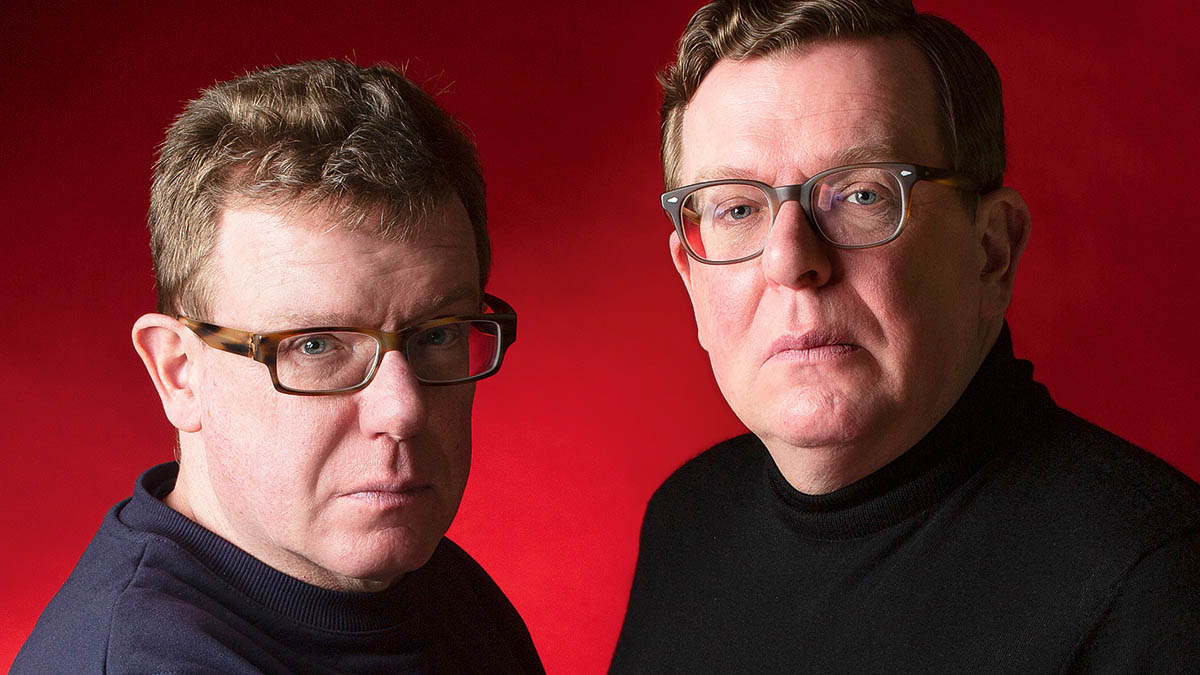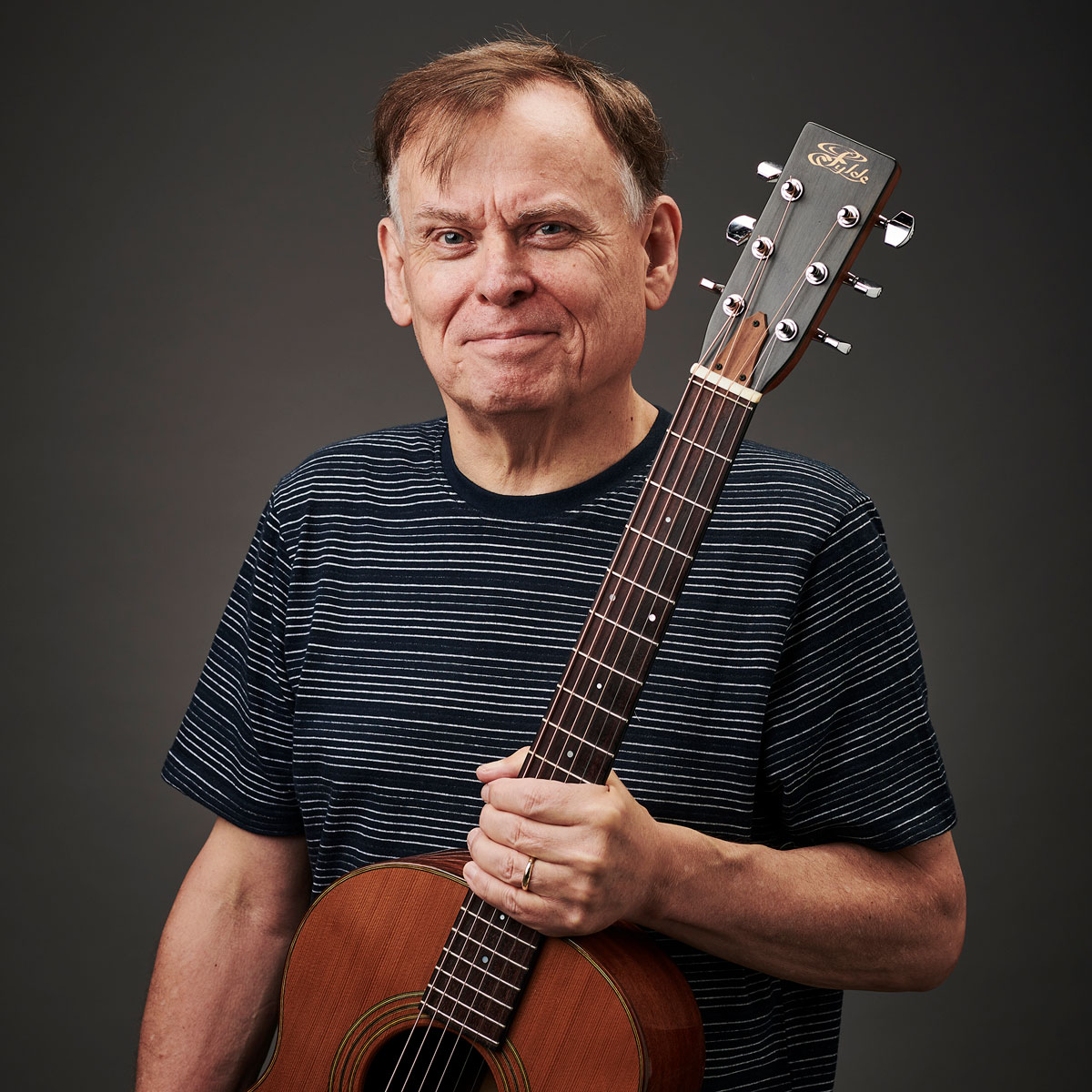The Proclaimers’ Charlie Reid talks acoustic guitars, songwriting and working with James Dean Bradfield on the Scottish rock institution's life-affirming new album
The Proclaimers are back with their own signature brand of earworm choruses tempered with that familiar Scottish lilt, and it's a sound that takes many Taylor acoustics to put together

The new Proclaimers album, Dentures Out, features 13 songs in only 34 minutes with not a single word or guitar chord wasted. It also has a surprise guest in the shape of Manic Street Preachers’ James Dean Bradfield.
It’s very cathartic to hear really good songwriting addressing the maladies that post-Brexit Britain suffers from at the moment, so we begin our conversation by asking Charlie Reid if it was cathartic for them to write, too?
“The writing of the songs started before lockdown and then was affected, as everybody was, by the fact that it’s the longest period probably that Craig and I couldn’t actually stand with everyone and sing together, and that did slow things down a bit. It was a bit frustrating, but we didn’t get hit as badly as some people did.
“It was certainly cathartic, but I think it was very important for us to do it when we did. The songs are not directly about lockdown, obviously, although a couple of them have that feel. If there’s ever been a theme on a Proclaimers record – and I think this is the first time there’s been one – it’s been about looking back and nostalgia.
“How people look back, whether they do so accurately, whether they do so through rose-coloured glasses, and how people examine the past and how that affects their view of the future. I think that’s what the record’s theme is.”
It’s a really super band that you got together to record this album.
“I think it’s probably the fifth time we’ve recorded down at [Rockfield Studios] in Monmouth and certainly the third time with Dave Eringa, who was the producer of the record. We had Zac Ware on guitar and Stevie Christie on keyboards, Clive Jenner on the drums and Gary John Kane on the bass.
Get The Pick Newsletter
All the latest guitar news, interviews, lessons, reviews, deals and more, direct to your inbox!
“We brought other people in, including James Dean Bradfield, and it was just a lot of fun to do it. Unfortunately, I contracted Covid the week before so I was two or three days late getting to Wales. So the guys laid down about four or five basic tracks before I got there. I just came in with a slightly blocked ear and a bit of a sore throat, just got on with it and we were done within a couple of weeks.”

Would you say that you’re pretty prolific writers or do you like to work on a song for a long time?
“We have become more prolific in the last 15 years, I think. At the start of our career it was very stop and start. Everybody’s got their first record ready to go by the time they sign the deal and we made [This Is The Story, 1987] and then we made another record 18 months later, the Sunshine On Leith one, which had the hit [I’m Gonna Be] (500 Miles) on it.
“Then we didn’t make another record until ’94, I think [Hit The Highway]. And then not until 2001 [Persevere] and some of that was because we were having families, wives, kids being born – you know, a lot of stuff going on. But since 2001 pretty much every three years we’ve put a record out.”
Was it Zac playing pedal steel on Play The Man or did you get someone else in to play on that track?
“That was Zac. By the time Zac came into the band, he’d already started playing the pedal steel and he rapidly improved. He’s all over that song and it really makes it. It’s not an easy instrument to play; I mean, it’s not just the pedals and the slide bit, it’s the knees as well. I don’t know how the hell he does it.”
How much of an influence is country music on you?
“It’s always influenced us – along with R&B and Black music, which was the bedrock of what most British musicians were doing in the early ’60s. Along with that we began with The Beatles and even The Stones to some degree, but certainly The Beatles were always an influence.
“But George Jones was a big influence, and Merle Haggard, certainly as a songwriter. And, you know, some of the great guitar players, too – Jerry Reed, obviously, and Chet Atkins. People don’t talk about them any more, how influential those guys were – [and] Glen Campbell, who actually started off as country.
“So, yeah, the playing and the songwriting style, the directness of contribution and the fact that we occasionally use waltz rhythms as well, which is always a giveaway that a band has been influenced by country music.”
Do you have a particular method between the two of you for bringing a song to fruition?
“Any and all to some degree. Craig does a lot more than I do. We come in and start rehearsing in a little flat that we use just for rehearsals and we just sort of muck about with the songs until they get the right feel. We normally start with a melody and then put something around it and try to write it in a different way to something we’ve done before.
“You’re approaching similar themes, but you try to write them from a slightly different point of view. So that’s something I think is a craft and hopefully you get somewhat better as you get older.
“You don’t want to complicate it, don’t [want to] put too many chords in unless you need to, and make it fairly straightforward. And that’s certainly from all the things we liked – The Beatles’ songwriting, country music, old R&B records that just made the point. Try to make the point in two or three minutes.”
What guitars did you take into the studio for the album?
“I always take in Taylor acoustics. We’ve built them up over the years, I think we have six now. Interestingly, the guitar tech was looking for replacements – not that they’re terribly damaged but just for the future. Zac’s got a couple of acoustics including a very good Martin and there’s his Les Paul and that pedal steel.”
Tell us about James Dean Bradfield’s contribution to this record.
“Absolutely fantastic. I knew from the many great records over the years what a great songwriter he was and what a fantastic player. James sort of came in, settled down and said, ‘Are you sure this is what you want?’ I don’t know if there was a touch of uncertainty. And yet he was playing fantastic and he just got better and better, better and better with almost every take. Total mastery. And he plays with passion and that was really important for us.”
- Dentures Out is out now via Cooking Vinyl.
With over 30 years’ experience writing for guitar magazines, including at one time occupying the role of editor for Guitarist and Guitar Techniques, David is also the best-selling author of a number of guitar books for Sanctuary Publishing, Music Sales, Mel Bay and Hal Leonard. As a player he has performed with blues sax legend Dick Heckstall-Smith, played rock ’n’ roll in Marty Wilde’s band, duetted with Martin Taylor and taken part in charity gigs backing Gary Moore, Bernie Marsden and Robbie McIntosh, among others. An avid composer of acoustic guitar instrumentals, he has released two acclaimed albums, Nocturnal and Arboretum.
“His songs are timeless, you can’t tell if they were written in the 1400s or now”: Michael Hurley, guitarist and singer/songwriter known as the ‘Godfather of freak folk,’ dies at 83
“The future is pretty bright”: Norman's Rare Guitars has unearthed another future blues great – and the 15-year-old guitar star has already jammed with Michael Lemmo










